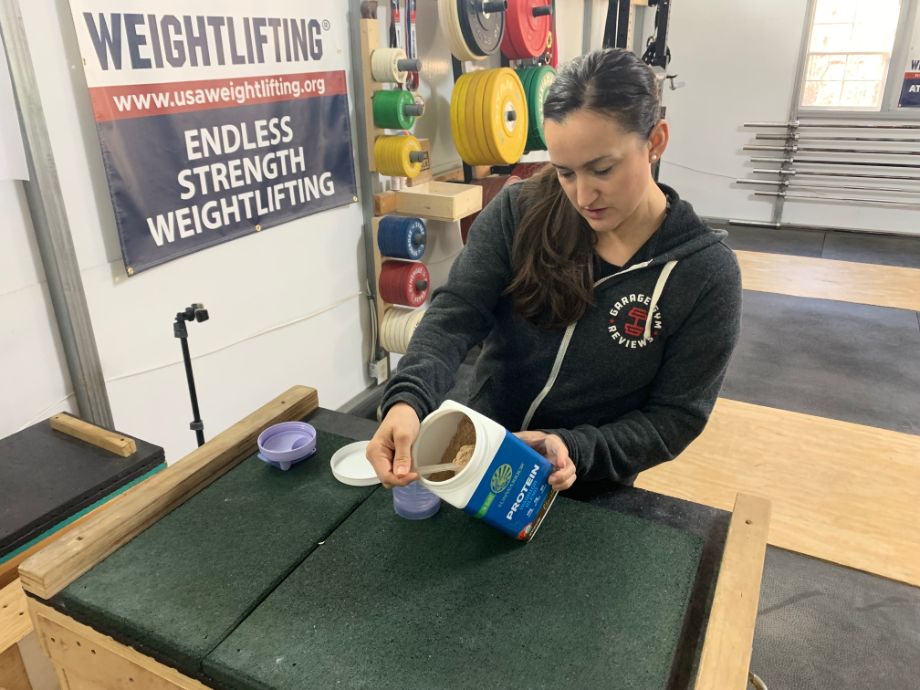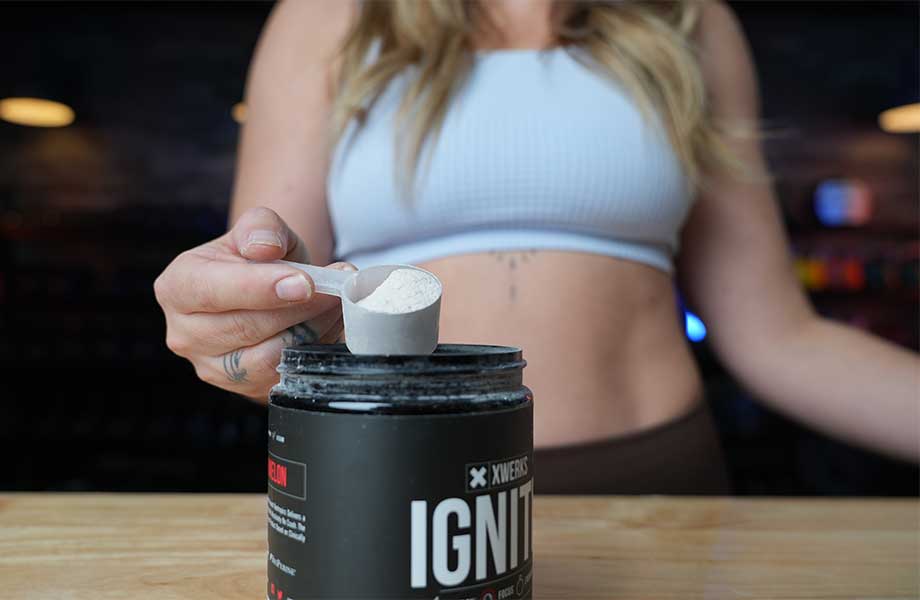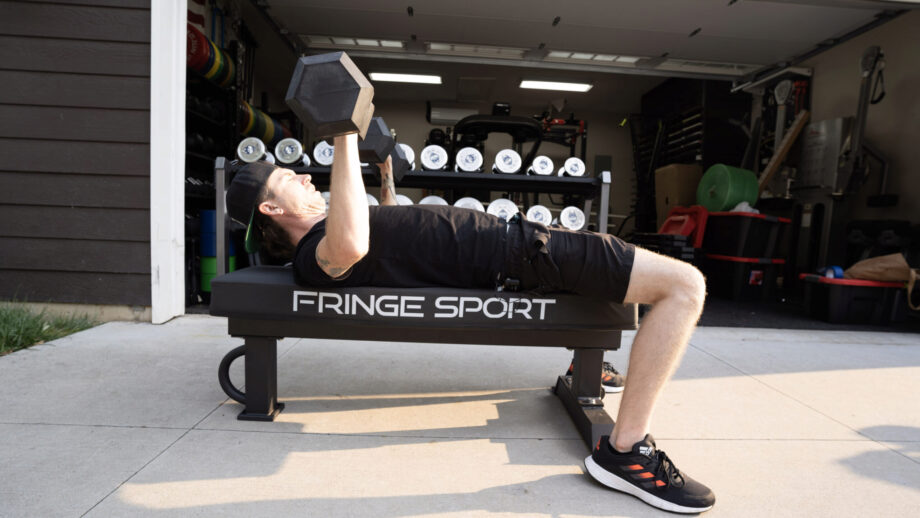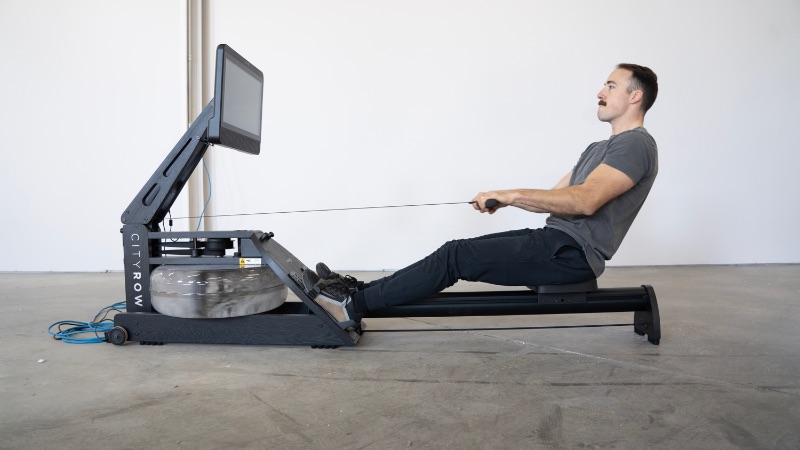Creatine is one of the most researched and effective sports supplements, and most weightlifters and strength athletes are well aware of the ways creatine can improve athletic performance. But what about creatine for runners?
Many of the benefits of creatine involve strength and power output, but that doesn’t mean creatine and cardio shouldn’t also go hand-in-hand, even though the research on creatine and endurance has shown mixed results.
Creatine isn’t very effective for improving endurance, but for shorter durations of high-effort running or interval training, it can certainly help with energy production. Plus, the most proven benefits of creatine are improved strength, power, and muscle growth, which can benefit any type of athlete, including long-distance runners.
RELATED: 13 Best Supplements for Runners
What is Creatine?
Creatine is a naturally occurring compound that’s produced by your liver, kidney, and pancreas from three amino acids–arginine, glycine, and methionine. It’s also found in animal proteins like red meat and fish and is often supplemented in powder or capsule form. When you take creatine supplements, concentrations of creatine stored in your body increase over time, which is difficult to achieve from food alone.
About 95% of the creatine in your body is stored in skeletal muscle tissue, and small amounts may be found in other organs, like your brain. It’s stored as phosphocreatine, or creatine phosphate, and used as an energy source for your muscles where it can improve strength and power output during anaerobic exercise1.
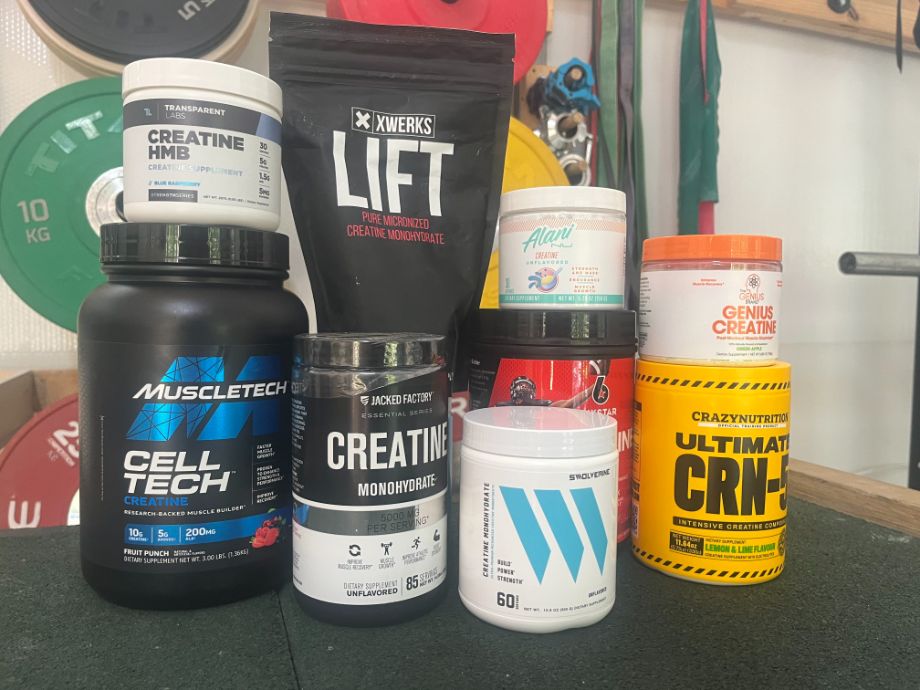
Anaerobic exercise is shorter bursts of high-intensity exercise like weight lifting, sprinting, or interval training, while aerobic exercise is lower-intensity, prolonged exercise, like running or cycling.
Different types of exercise use different energy systems, and high-intensity training uses the phosphagen system, which relies on adenosine triphosphate, or ATP. When ATP stores run out, your muscles quickly fatigue. Create is stored in the body as phosphocreatine, which helps supply more energy.
According to sports dietitian Destini Moodi, RDN, CSSD, LD: “When ATP is consumed for energy, it becomes ADP. To prevent muscle fatigue, ADP must get the phosphate group back since ADP cannot be used for energy. This is where the phosphocreatine can “donate” its phosphate molecule to ADP to make it ATP again, thus providing the body with more energy and delaying muscle fatigue during anaerobic activities like weightlifting.”
What are the Benefits of Creatine?
Now that we know what creatine is, let’s take a closer look at some of the proven benefits of creatine. Creatine has been studied for all kinds of benefits, including reduced muscle damage, decreased muscle soreness, faster recovery, increased lean muscle mass, and more, but some of these benefits have shown mixed results over the years.
Here are the most proven benefits of creatine supplementation that runners should know about.
May Support Endurance Training
To start, the benefits of creatine on endurance performance are questionable at best. A 2023 meta-analysis2 found that creatine supplementation did not improve endurance performance in a trained population.
Meanwhile, this 2023 study3 showed that creatine might be beneficial for endurance athletes, but mostly when the events require a surge in intensity, such as a sprint to the finish line at the end of the race.
In other words, the direct impact of creatine on endurance is unclear, but the next few benefits are quite clear and will benefit nearly everyone.
Improves Strength and Power Output
Creatine is best known for improving strength and power output, as it increases the production of adenosine triphosphate (ATP), which is used for muscle contractions.
ATP fuels high-intensity exercise like lifting weights, jumping, and sprinting, but after 8 to 10 seconds, your ATP stores are depleted. ATP production is determined by phosphocreatine stores4, which is how creatine is stored in your muscles, so supplementing with creatine increases ATP production.
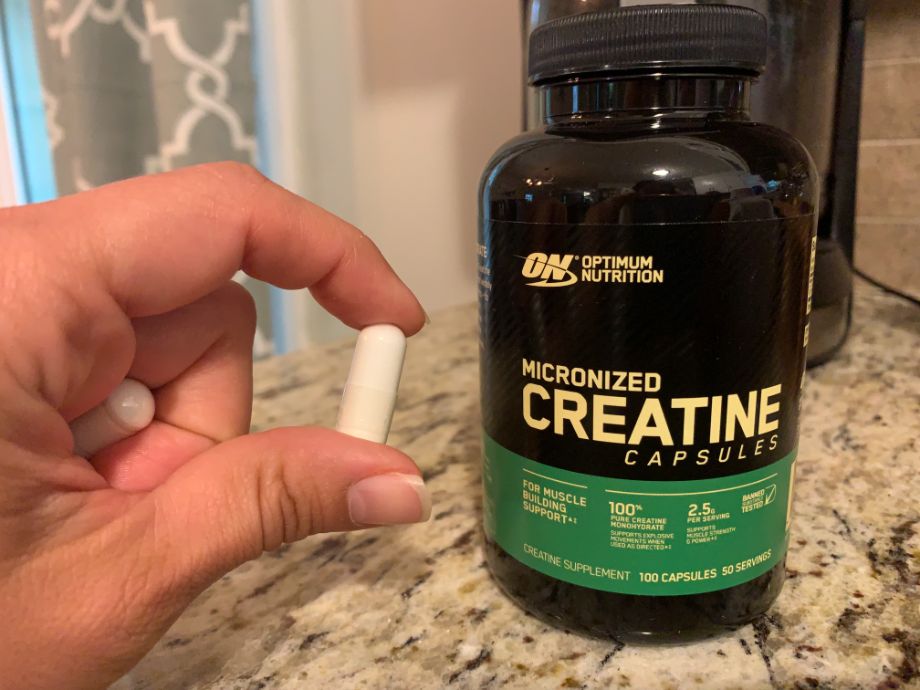
Any athlete who relies on repeated high-intensity efforts will benefit from increased strength and power, including bodybuilders, cyclists, weightlifters, and sprinters. Even if your primary sport is running, if you do any strength training or interval training on the side, a good creatine supplement will enhance your performance.
RELATED: 16 Best Creatine Supplements
Increases Lean Body Mass
Creatine supplementation can help you build muscle, according to this review5 that examined nine years of creatine trials.
It’s unclear whether this is due to the ability to get more reps out of each set, or if creatine directly increases muscle recovery and protein synthesis, but there’s no question that creatine can help you gain more muscle mass with regular resistance training.
May Support Cognitive Function
While most creatine research has focused on muscular power and strength, there’s a growing body of research showing that creatine may have potential benefits on cognitive health and performance.
This review6 shows that creatine can improve cognitive functioning, which would be things like memory and information recall, but may only do so when you’re in a state of fatigue. Further research is needed to make any definitive claims.
When Should Runners Take Creatine?
Unlike stimulants or pre-workouts, which are fast-acting supplements you’ll feel when they kick in, your creatine stores increase over time with regular supplementation. Some older research from 20138 shows a slight benefit to taking creatine post-workout, but this was in weightlifters, not runners.
However, creatine does pull more water into your muscles, so keep this in mind when planning your creatine intake. If you’re taking creatine in a pre-workout before a run, make sure to take in plenty of fluids to avoid cramping.
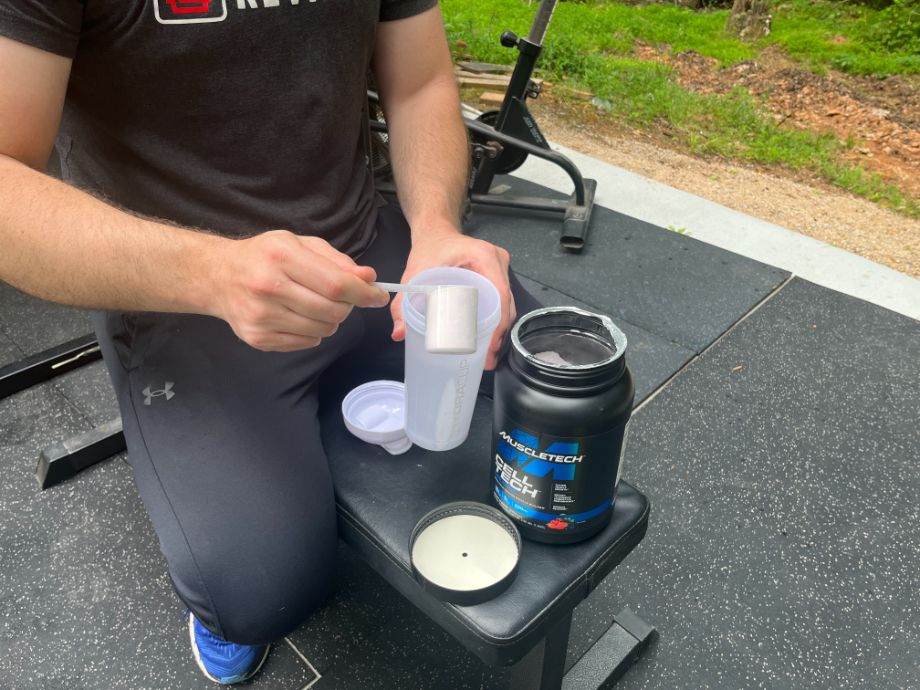
The recommended daily dose is 3 to 5g9, so you can add that to a smoothie, post-workout shake, or take it any other time that’s convenient for you. Regardless of timing, the creatine will still build up in your body.
RELATED: Best Pre-Workout with Creatine
How to Use Creatine for Runners
Before you start adding creatine to your daily supplement stack, there are two important things you need to keep in mind.
Stay Hydrated
One common side effect of creatine is increased water retention10, as creatine pulls water into your muscle cells. This is a harmless side effect, but you must increase your water intake when using creatine, especially if you’re a runner who sweats a lot.
With extra water being pulled into your muscles, you need to take in plenty of fluids to replace that water. Exactly how much water should you drink with creatine? Approximately 8 ounces with each dose, and then calculate your daily hydration needs on top of that. Creatine is very safe, but some users report cramping and stomach discomfort as a side effect, which is usually due to insufficient water intake.
RELATED: Hydration for Runners
Monitor Your Body Weight if Needed
Creatine can increase muscular water retention, similar to glycogen (which is stored carbohydrates), as well as lean body mass, which means you’ll weigh more than before. If weight gain is a concern, this could negatively impact your performance.
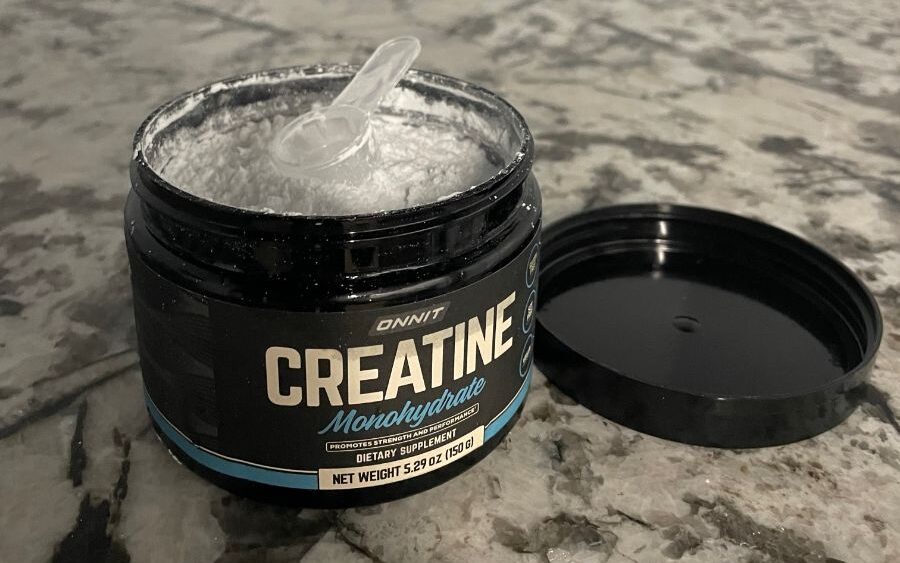
If this happens, and you find that creatine is slowing you down without any benefits, it may not be a great fit for your goals.
Skip the Loading Phase
Many people like to use a creatine loading phase, which involves taking high doses to fill your body’s creatine stores as fast as possible. This is the most common reason people experience bloating, cramping, and even diarrhea, which would interfere with your running. You’ll still see the benefits even if you skip the loading phase.
Who Shouldn’t Use Creatine?
Creatine generally isn’t recommended for people with heart, liver, or kidney disease, and be sure to ask your doctor if creatine will interfere with any prescription medications you’re taking.
The most common side effects are digestive issues from taking too much creatine for your body to handle at once, which can often happen in the creatine loading phase. That said, the use of creatine has been shown to be very safe7, even in high doses taken for extended periods of time.
Destini Moody, RD, CSSD, LD, says that as a healthy adult, you’d have to go out of your way and try really hard to take enough creatine to cause dangerous side effects. However, a loading phase can cause GI distress, stomach cramps, and diarrhea.
Creatine for Runners: Final Thoughts
While creatine has a solid reputation for increasing strength and muscle mass, it may also be quite beneficial for runners, especially for shorter bursts of energy like sprinting up a hill or sprinting toward the finish line of a race.
Creatine may not have much of an impact on distance running, but it’s very useful for increasing strength and power, and that may have an indirect effect on running performance.
If you’re interested in trying this supplement to improve your exercise performance, 3 to 5 grams of creatine per day is a great place to start.
Creatine for Runners: FAQs
Should a runner take creatine?
While the research on creatine and endurance shows mixed results, it’s very clear that creatine can increase strength, power, and muscle mass, which is beneficial for all types of exercise. Runners who do any kind of sprinting or interval work will benefit from creatine.
Which kind of creatine is best?
While many types of creatine exist on the market, the research shows9 that none are more effective than creatine monohydrate, which is the most simple, affordable form of creatine.
Does creatine make you run faster?
Creatine can improve muscle strength and endurance, allowing you to get a few more seconds of high-intensity training before you fatigue. It may not directly make you run faster, but you’ll be able to sprint longer. Creatine also supports muscle growth, and over time, more muscle may improve running performance11.
Should you take creatine before or after a run?
The timing doesn’t matter very much, as creatine builds up in your body over time. That said, older studies have shown slightly more benefit from taking creatine post-workout, though this was in weightlifters, and creatine can cause cramping if you’re not taking enough fluids. If you take it before a run, be sure to stay hydrated, or simply take it after your run to be safe.
These statements have not been evaluated by the Food and Drug Administration. This product is not intended to diagnose, treat, cure, or prevent any diseases.
References
- Buford TW, Kreider RB, Stout JR, et al. International Society of Sports Nutrition position stand: creatine supplementation and exercise. J Int Soc Sports Nutr. 2007;4:6. Published 2007 Aug 30. doi:10.1186/1550-2783-4-6
- Fernández-Landa J, Santibañez-Gutierrez A, Todorovic N, Stajer V, Ostojic SM. Effects of Creatine Monohydrate on Endurance Performance in a Trained Population: A Systematic Review and Meta-analysis. Sports Med. 2023;53(5):1017-1027. doi:10.1007/s40279-023-01823-2
- Forbes SC, Candow DG, Neto JHF, et al. Creatine supplementation and endurance performance: surges and sprints to win the race. J Int Soc Sports Nutr. 2023;20(1):2204071. doi:10.1080/15502783.2023.2204071
- Sahlin K. Muscle energetics during explosive activities and potential effects of nutrition and training. Sports Med. 2014;44 Suppl 2(Suppl 2):S167-S173. doi:10.1007/s40279-014-0256-9
- Wu SH, Chen KL, Hsu C, et al. Creatine Supplementation for Muscle Growth: A Scoping Review of Randomized Clinical Trials from 2012 to 2021. Nutrients. 2022;14(6):1255. Published 2022 Mar 16. doi:10.3390/nu14061255
- Roschel H, Gualano B, Ostojic SM, Rawson ES. Creatine Supplementation and Brain Health. Nutrients. 2021;13(2):586. Published 2021 Feb 10. doi:10.3390/nu13020586
- Kreider RB, Melton C, Rasmussen CJ, et al. Long-term creatine supplementation does not significantly affect clinical markers of health in athletes. Mol Cell Biochem. 2003;244(1-2):95-104.
- 1.Antonio J, Ciccone V. The effects of pre versus post workout supplementation of creatine monohydrate on body composition and strength. Journal of the International Society of Sports Nutrition. 2013;10(1). doi:https://doi.org/10.1186/1550-2783-10-36
- Antonio J, Candow DG, Forbes SC, et al. Common questions and misconceptions about creatine supplementation: what does the scientific evidence really show?. J Int Soc Sports Nutr. 2021;18(1):13. Published 2021 Feb 8. doi:10.1186/s12970-021-00412-w
- Powers ME, Arnold BL, Weltman AL, et al. Creatine Supplementation Increases Total Body Water Without Altering Fluid Distribution. J Athl Train. 2003;38(1):44-50.
- Šuc A, Šarko P, Pleša J, Kozinc Ž. Resistance Exercise for Improving Running Economy and Running Biomechanics and Decreasing Running-Related Injury Risk: A Narrative Review. Sports (Basel). 2022;10(7):98. Published 2022 Jun 24. doi:10.3390/sports10070098



